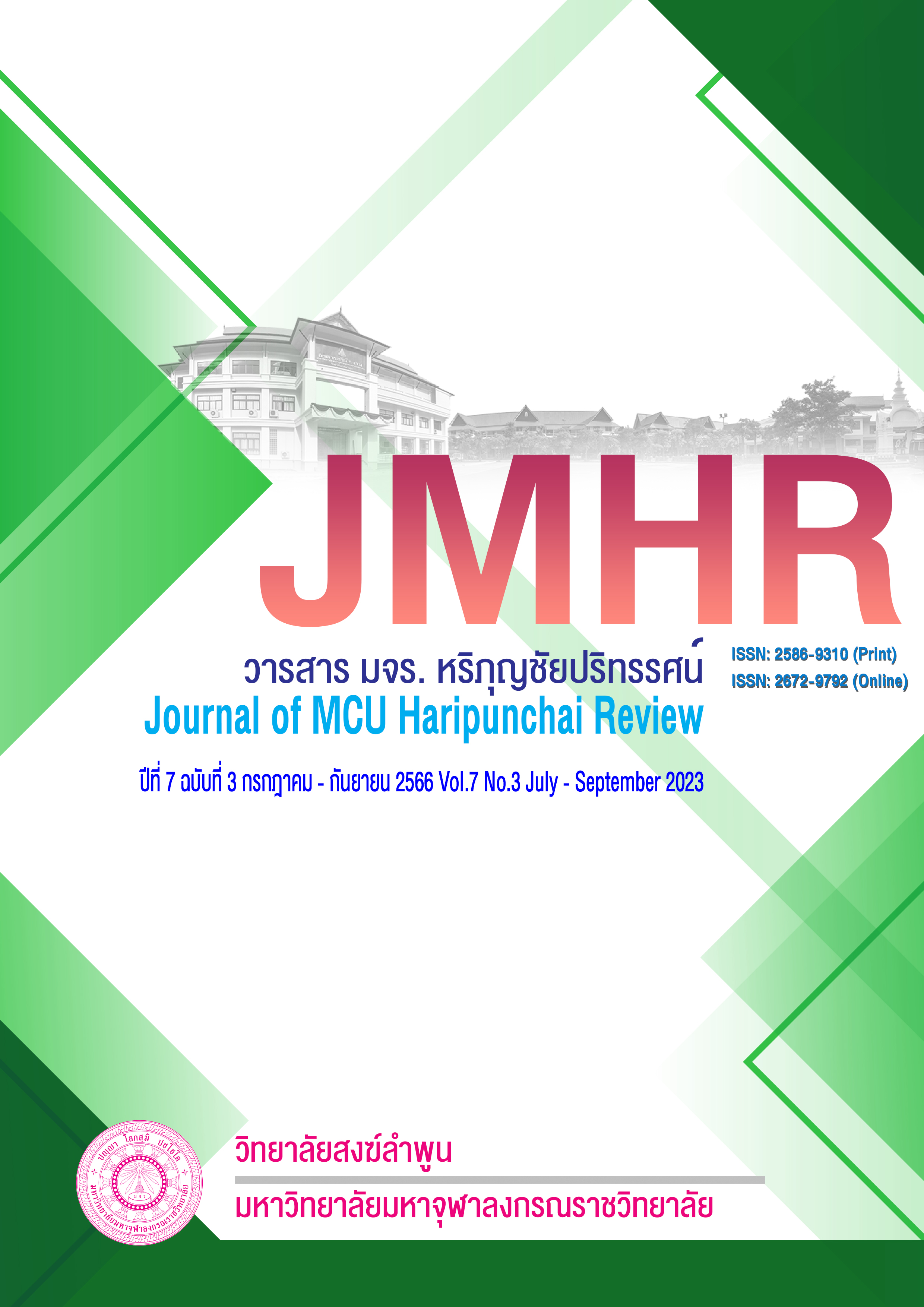Guidelines for the Management of Buddhist Educational Institutions
Main Article Content
Abstract
Both formal and non-formal education is the basic education of all Thai people, called qualifications, through passing the level examinations of each stage. Education in today's era has developed very quickly with information technology systems that are unconsciously inserted into the education system. Thus, both formal and informal education tends to lack morality and ethics. Therefore, the management of educational institutions should focus on Buddhist principles to be integrated with the problem situations in the way of modern society. To be consistent with the way of life today and as a way to help students who face a variety of problems from a rapidly developing society. By applying Buddhist principles as a guideline for educational institution management to be in line with the rapidly changing social environment with information technology.
Educational institution means a social institution which deals with the formalization and transmission of culture. educating and professional skills training for being a good member of society Educational institutions include schools, universities, ministries, bureaus and departments that are responsible for education. These social groups consist of position or social status such as teacher, lecturer, etc. Duties of educational institutions is the transfer of knowledge, culture and skills necessary for living in society Educational institutions are one of the key components of social stratification. Therefore, educational institutions are likened to a place to polish and convey culture, knowledge and good professional skills for living in society.
Article Details

This work is licensed under a Creative Commons Attribution-NonCommercial-NoDerivatives 4.0 International License.
References
ณิชาภัทร เงินจัตุรัส. (2556). การประยุกต์สติปัฏฐานสี่สู่การจัดการเรียนรู้ของนักเรียนชั้นประถมศึกษาปีที่ 4-6 วรรณรัตน์โรงเรียนศึกษา. อำเภอเมือง จังหวัดขอนแก่น" ปริญญาโท
พุทธนิพนธ์. วิทยาลัย: จุฬาลงกรณ์มหาวิทยาลัย
ติน ปรัชญาพฤทธิ์. (2551). การบริหารการพัฒนา. กรุงเทพมหานคร: สำนักพิมพ์แห่งจุฬาลงกรณ์ มหาวิทยาลัย.
บุญส่ง ทองเอียง. (2563). พฤติกรรมการนำหลักไตรสิกขาไปใช้ในชีวิตของนักศึกษามหาวิทยาลัยมหามกุฏราชวิทยาลัย วิทยาเขตศรีธรรมาโศกราช. วารสารสังคมศาสตร์และมานุษยวิทยาเชิงพุทธ วัดวังตะวังตก. 5 (6), 78-89.
ปกรณ์ ลิมปนุสรณ์. (2556). แนวทางแห่งสันติวิธีในปรัชญามั่วจื่อ: ความรัก ความเท่าเทียมผลประโยชน์ และครรลองธรรม. วารสารจีนศึกษา. 6(6), 25-52.
ไพรัช สู่แสนสุข และบรรเจิดพร รัตนพันธุ์. (2556). เส้นทางสู่โรงเรียนวิถีพุทธ. [ออนไลน์]. แหล่งที่มา : http://www.moe.go.th/main2/article/article_banjerdporn/school_bud.htm.
พจนานุกรมพุทธศาสนา ฉบับประมวลธรรม (2546). “อิทธิบาท 4”. [ออนไลน์]. แหล่งที่มา : https://๘๔๐๐๐.org/tipitaka/dic/d item.php?i=213.
พระมหาโยธิน โยธิโก และคณะ. (2563). โรงเรียนวิถีพุทธ พุทธธรรมประยุกต์เพื่อการศึกษา. [ออนไลน์]. แหล่งที่มา : www.vitheebuddha.com /main.php?url=about&id.
พระมหาวิชาญ สุวิชาโน. (2563). การพัฒนารูปแบบการดำเนินงานโรงเรียนวิถีพุทธ. วารสารมหาจุฬา นาครทรรศน์. 8 (1), 248.
วรพจน์ บุษราคัมวดี. (2552). องค์การและการจัดการ. ปทุมธานี: มหาวิทยาลัยราชภัฏวไลยลงกรณ์ ในพระบรมราชูปถัมภ์.
วิโรจน์ สารรัตนะ. (2555). แนวคิด ทฤษฎี และประเด็นเพื่อการบริหารทางการศึกษา. กรุงเทพฯ : ทิพยวิสุทธิ์.
ศิริ ถีอาสา. (2557). เทคนิคการจัดการคุณภาพแนวใหม่ : แนวคิด หลักการสู่การบริหารจัดการคุณภาพการศึกษา = Benchmarking, balanced scorecard and learn six sigma.มหาสารคาม: โรงพิมพ์มหาวิทยาลัยราชภัฏมหาสารคาม.


